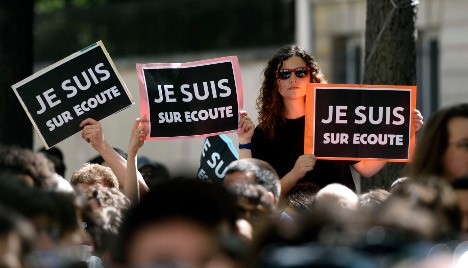'French Snowdens' to get protection under law

French MPs have voted through a new amendment to the controversial surveillance bill, which would allow whistleblower spies to be protected by law.
The new surveillance laws were presented to parliament on Monday, with Prime Minister Manuel Valls insisting the move was not a snap reaction to the Paris terror attacks in January that left 17 dead.
On Thursday, a "whistleblower" amendment was voted through by MPs, meaning that those working for the intelligence services would be protected by law if they were to report any illegal intelligence gathering to a newly created authority, known as the CNCTR.
This would mean that anyone like Edward Snowden, the former spy who famously leaked classified information from America's National Security Agency (NSA), would not be punished for their efforts.
Jean-Jacques Urvoas, the Socialist MP who drafted the surveillance bill, said the amendment was inspired by the famed American whistleblower, who has spent the past few years in Moscow after his US passport was revoked.
"The Snowden case... has demonstrated the need to create conditions so that agents can denounce any abuse by the intelligence services", Urvoas said on Thursday.
Sur ma proposition, L'@AssembleeNat adopte un statut pour les lanceurs d'alerte au sein des services de renseignement #PJLRenseignement
— Jean-Jacques Urvoas (@JJUrvoas) April 16, 2015
(Urvoas announces on Twitter that the National Assembly has adopted his amendment)
The entire bill has been hugely controversial in France, with critics saying the proposals will lead to mass surveillance of the French public and an infringement of individuals' privacy.
But the government insists the laws are vital for effective policing with France facing, in the words of Valls, its greatest ever terrorist threat.
The new law allows authorities to spy on the digital and mobile communications of anyone linked to a "terrorist" investigation without prior authorisation from a judge, and forces Internet Service Providers (ISPs) and phone companies to give up data upon request.
Intelligence services will have the right to place cameras and recording devices in private dwellings and install "keylogger" devices that record every key stroke on a targeted computer.
The authorities will be able to keep recordings for a month, and metadata for five years.

("I'm being wire tapped" - Civil liberty supporters present on a twist on the famous "Je Suis Charlie" slogan. Photo: AFP)
Comments
See Also
The new surveillance laws were presented to parliament on Monday, with Prime Minister Manuel Valls insisting the move was not a snap reaction to the Paris terror attacks in January that left 17 dead.
On Thursday, a "whistleblower" amendment was voted through by MPs, meaning that those working for the intelligence services would be protected by law if they were to report any illegal intelligence gathering to a newly created authority, known as the CNCTR.
This would mean that anyone like Edward Snowden, the former spy who famously leaked classified information from America's National Security Agency (NSA), would not be punished for their efforts.
Jean-Jacques Urvoas, the Socialist MP who drafted the surveillance bill, said the amendment was inspired by the famed American whistleblower, who has spent the past few years in Moscow after his US passport was revoked.
"The Snowden case... has demonstrated the need to create conditions so that agents can denounce any abuse by the intelligence services", Urvoas said on Thursday.
Sur ma proposition, L'@AssembleeNat adopte un statut pour les lanceurs d'alerte au sein des services de renseignement #PJLRenseignement
— Jean-Jacques Urvoas (@JJUrvoas) April 16, 2015
(Urvoas announces on Twitter that the National Assembly has adopted his amendment)
The entire bill has been hugely controversial in France, with critics saying the proposals will lead to mass surveillance of the French public and an infringement of individuals' privacy.
But the government insists the laws are vital for effective policing with France facing, in the words of Valls, its greatest ever terrorist threat.
The new law allows authorities to spy on the digital and mobile communications of anyone linked to a "terrorist" investigation without prior authorisation from a judge, and forces Internet Service Providers (ISPs) and phone companies to give up data upon request.
Intelligence services will have the right to place cameras and recording devices in private dwellings and install "keylogger" devices that record every key stroke on a targeted computer.
The authorities will be able to keep recordings for a month, and metadata for five years.

("I'm being wire tapped" - Civil liberty supporters present on a twist on the famous "Je Suis Charlie" slogan. Photo: AFP)
Join the conversation in our comments section below. Share your own views and experience and if you have a question or suggestion for our journalists then email us at [email protected].
Please keep comments civil, constructive and on topic – and make sure to read our terms of use before getting involved.
Please log in here to leave a comment.